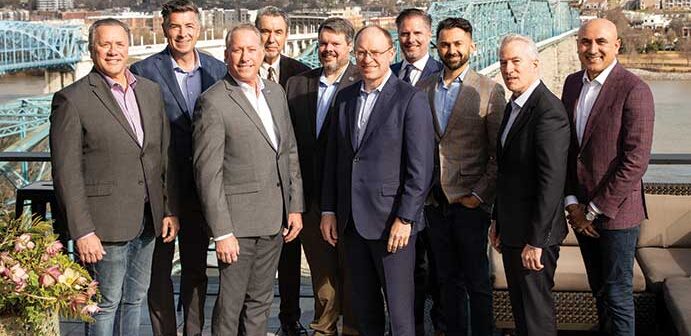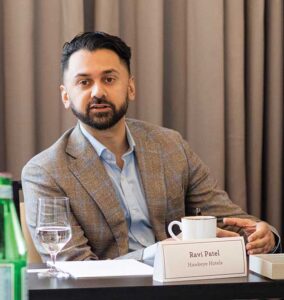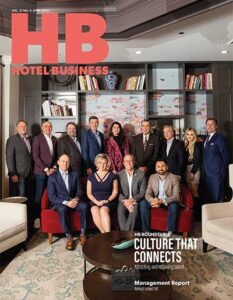The Edwin Hotel, Autograph Collection, in Chattanooga, TN, tells a story. It’s a simple story, but one that packs a punch. Right outside the hotel’s walls stands a bridge—a bridge that was once threatened with demolition. But, with the help of a few city leaders who recognized its great history, that bridge continues to stand tall. In fact, it’s now one of the longest pedestrian bridges in the country.
The Edwin Hotel continues to tell the story of the bridge, which happens to be one of connection. So much so, in fact, that a quote from Sir Isaac Newton adorns one of the hotel’s walls, reading: “We build too many walls and not enough bridges.”

LEFT TO RIGHT: Greg Bohan, Florida Atlantic University; Jim McPartlin, Highgate; and Todd Orlich, Virgin Hotels.
The story of the bridge has proved to stand the test of time, as connection is still a relevant theme today, especially in the hospitality industry. So, what better place to host a Hotel Business roundtable discussion on culture and connection?
Hosted and sponsored by Humanist Hospitality, the roundtable’s panelists discussed two issues that are top of mind for hoteliers that just happen to go hand-in-hand: creating a positive company culture and managing the labor crisis.
Moderated by Hotel Business’ Christina Trauthwein, the conversation began with culture and its connection to retaining workforce.
The panel of experts included Ravi Patel, president, Hawkeye Hotels; Del Ross, chief revenue officer, Hotel Effectiveness; Chip Rogers, president/CEO, AHLA; Jim McPartlin, chief people officer, Highgate; Greg Bohan, instructor, Hospitality and Tourism Management Program, Florida Atlantic University; Todd Orlich, VP, operations, Virgin Hotels; Kelley Jones, founder/COO, Hospitality Alliance; David Martin, COO, Humanist Hospitality; and O’Mally Foster, VP, culture and talent resources, Humanist Hospitality.
“The companies that got culture before [COVID] are in an incredible position because they get it,” Ross said. “The other ones now get to see that culture is not just hand waving; culture’s actually a thing—you can decide to do this.”
He continued, “We are on the cusp of being so much better than we were. At conferences, you hear CEOs of hotel companies and analysts ask, ‘When do you think we’ll get back to 2019?’ We do not want to go back to 2019, at least on a people front. We had the worst turnover we’ve ever had in history—prior to last spring—in 2019. We couldn’t hang onto anybody. We had problems with wages, with quality [and]with loyalty. We have an opportunity to revitalize this industry and make it everything it can be while still maintaining its roots.”
The panelists agreed that hospitality’s roots are something well worth clinging to, as it’s the reason they became a part of the industry themselves. The issue, however, is communicating that sentiment effectively with potential associates.
“A lot of the mission, vision and values of the organization going back to even the ’60s and ’70s are exactly as they have always been,” Orlich said. “What’s changed for us is how we deliver that message to our colleagues, and it has to be much more personalized, much more detailed and specific to their needs and what they are interested in learning about. It has to be put in the context of their own growth and development. ‘What’s in this for me?’”
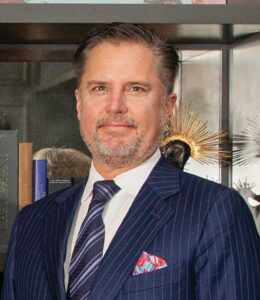
“People don’t leave because they’re thrilled with you; they leave because there’s something underneath the surface, and we need to find that.” —Todd Orlich Virgin Hotels
Workforce needs have certainly shifted, especially in the past two years, as it adapts to a more remote world but also one that is highly personalized.
“We’ve broken the trust. All employers have broken the trust of our associates. I think it’s incumbent upon all of us to figure out how to rebuild that in our own individual way. Individualism is probably the key differentiator that we need to identify with. People’s needs have all changed and their view of our organization and their view of their loyalty has changed,” said Martin, who explained that upward mobility is another key to job satisfaction for associates; it’s not just about compensation or being comfortable, but continuing to learn and feeling like they’re contributing.
Associate development is paramount for Patel and Hawkeye Hotels as well, and the company does a full assessment with all associates of where they want to be in the short and long term.
“We hear our associates saying all of the time that at least they know if they start as a housekeeper and they want to be an exec or a general manager, there’s a plan for them,” he said. “If they tell us day one coming into our organization, ‘I’m good starting here, but here’s where I want to be,’ those are the people we want working within our organization. We’re very deliberately developmental of our associates.”
Aside from working with associates to map out growth and development, a major hurdle is acquiring new and loyal workers. So, how do companies get the messaging out successfully? How do they communicate effectively about an industry that was just decimated by a global pandemic?
“Our students are coming into a world that I have been in, and all the faculty has been in, telling them this is a wonderful life in the hospitality industry, but it’s like a recency error the last two years,” Bohan said. “They’ve heard nothing but horror stories and they’re like, ‘Why are we getting into this?’ What we’ve been trying to tell them is the world has changed completely.”
According to Bohan, a lot of his students feel they have already paid their dues, already working full-time and don’t want to perform tasks like picking up undesirable shifts with low pay, doing night audits and taking out the garbage.
However, what the industry needs to keep reminding the younger workforce about is the foundation upon which it was built and still thrives: its people.
“I’m an ex-Disney person from the ’80s and to paraphrase Walt Disney, ‘You can build the most amazing place in the world, but it takes people to make it a reality,’” McPartlin said. “I remember the glamour and the crazy shifts…there was all that and more, but generationally that’s changed. So now we have to tap into what we do to make it seem fun and like magic.”

O’Mally Foster, Humanist Hospitality; Kelley Jones, Hospitality Alliance; and Lynn Mucciano, VP, sales and marketing, Humanist Hospitality
Jones recommends also tapping into current associates for insight.
“There’s an old saying that it’s easier to give birth than to resurrect,” he said. “Integrating the culture and hiring a new team member, they don’t know any other way than the way you train them. I learned something at 14 years old bussing tables—managers think they know what’s going on in the operation, but, if you want to know what’s going on, ask the team because they’re in the operation every single day.”
Panelists also noted the value of communicating job importance to associates, which can be accomplished in effective, consistent check-in conversations.
“Light bulbs go off that it’s not just this task,” Foster said. “[Associates think] you’re talking to me; you’re investing in me. Because we’ve made it so one-on-one, that humanistic approach that’s happening, that’s where I’m seeing the success in this.”
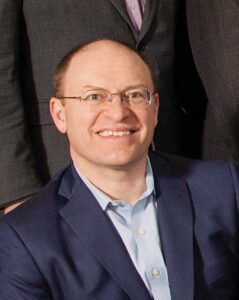
“We have an opportunity to revitalize this industry and make it everything it can be while still maintaining its roots.” —Del Ross Hotel Effectiveness
Being positive yet realistic is also something more tangible for associates. Rogers said that telling stories of attainable opportunities is key for young people looking into hospitality careers.
“If you [come across]a 17-year-old, a kid, a junior in high school, thinking about what career [they’re] going to go into, you can tell that kid, ‘Well you can start as a dishwasher and you may end up as a CEO,’ they’ll think, ‘Yeah, well I can also play in the NBA,’” he said. “But if you tell them, ‘Here are the five steps [that it’s]going to take, and if you do these things, within eight-10 years, you can be in this position making $150,000 a year.’ To them, that’s a ton of money and that makes sense. Those are the stories we have to do a better job of telling.”
Not just telling the stories but creating them is a realistic path to attaining talent, Ross said, explaining that the industry should focus on teaching the business rather the job. Not only can this help associates aspire for growth, but it can help create an intentional culture within the company.
“If you deliberately make these happen, we can create these stories and then not only do we get to tell them, but they start telling themselves and it becomes a fact,” he said. “It becomes the way our industry works as opposed to, ‘Gosh, how hard is it to find these stories?’ It should be everywhere if we do it right.”
Ross noted how vital creating culture is for hoteliers, highlighting that it costs 30% on top of annual cost each time an associate has to be replaced. He added that companies with well-defined, intentional culture see turnover rates that are half or lower than the rest of the industry.
“Half of the turnover means half the time they’re incurring that 30% penalty,” Ross said. “That means owners, managers and people are happier and there’s more money to go around. That’s good business.”
But how should the industry go about creating well-defined company culture? For some, it runs through the company’s bones and is communicated down; however, culture is evolving to meet new associate needs. A major requirement today, according to the panelists, is flexibility—hours, shifts and the flexibility to work from home.
Associates are also seeking useful benefits, compensation transparency and growth opportunities.
“We shouldn’t be afraid to talk about wage,” Patel said. “I may think [associates]want a gym membership and pet insurance, but what do they really want? They want to be paid and as fast as possible. Those are the conversations that need to be had more [often].”
Although job requirements have shifted and continue to evolve as the world does, there is a desire that has withstood time and transcends industries: the desire to feel needed.
“Human nature is to say, ‘What I do in life is valuable,’” Rogers said. “Here’s your job, here’s how you do it, go do it. We don’t take the time to say why your job matters and why then you do it. It makes a difference.”
McPartlin agreed, noting how checking in with associates makes them feel appreciated and vital to hotel operations. Asking questions like ‘How are you?’ ‘What motivates you?’ and ‘What makes you crazy?’ are all essential.
“People will look at you sometimes and say no one’s ever asked me that,” the Highgate executive said. “It’s a wonderful way to communicate. It’s back to…investing in our people.”
Just enforcing this level of recognition and concern can create strong culture and, hopefully, help to retain associates for the long term.
“We forget sometimes that culture has trickled down to the least common denominator,” Jones said. “How does culture get to the housekeeper or dishwasher? That’s what so important. Anytime I meet a new team member at any of our properties, I automatically walk up to them, introduce myself and thank them for working here and say, ‘You can survive here every day without me, but my business doesn’t survive without you. You are the brand to every single guest.’”
Jones said that the industry also forgets the significance of these simple gestures, like knowing someone’s name and something about them. Adding to that, Foster gave what he called the simplest example of how impactful that is.
“If anyone works with any organization and you don’t know them, that’s a problem; that’s where the culture goes off the rails,” he said. “Connection has to be much more than a phrase of culture, or just a thing we do, or process we have. It has to be really meaningful. If you don’t know the individuals working in partnership with you, that’s where things don’t connect.”
Job dignity also plays a role here. This means removing the stigma around certain tasks with each associate claiming responsibility for the entire guest journey. This means cross-training associates to perform different jobs and even for higher-level associates to pitch in doing tasks they normally would not, all to enhance the hotel experience.
“The most significant moments in a person’s life involve a hotel—not because of the hotel, but people going on a job interview, they stay in a hotel; you attend a wedding, you stay in a hotel; you have to go to a funeral, you stay in a hotel; you’re recognized with an industry award in a hotel ballroom—these big events, wonderful or sad or tragic, they involve us,” Ross said. “We’re in this incredible position where these people are placing this experience in our hands, and we can help and support and nurture it, or ruin it. Every person in the building has a role. There is no bottom-level position that doesn’t matter. Your job matters.”
Orlich explained a best practice that his company has in place, which he believes led to greater associate trust. He called this a “reset,” which was essentially communicating to the general managers that all turnover is bad.
“If you’re happy they left, you did something wrong in hiring them,” said the Virgin Hotels executive. “If you’re sad that they left because they were a high performer, then you did something wrong in managing them, and if you don’t know that they left, you’re not connected to your workers.”
He continued, “People don’t leave because they’re thrilled with you, they leave because there’s something underneath the surface and we need to find that. Get to them before they’re got by somebody else.”
While retaining workforce is one challenge, attracting skilled, loyal associates is quite another. For the workers that left hospitality for other industries, it can seem like a daunting task to bring them back.
Rogers mentioned three other pain points for the industry when it comes to people: 1. people aren’t having more kids today, they’re having less, 2. younger people are starting their careers later in life, while older people are retiring earlier, and 3. although the industry should be doing this, it’s difficult to convince someone to change industries and make the move to hospitality.
But, he did note one solution that seems to be most promising—importing people who want to experience the American Dream.
“The workforce participation rate in the U.S. is on a steady, dangerous decline,” Rogers said. “[However], there’s a great statistic out there that shows that people who have not been to the U.S. have a favorable view of the U.S. at about 20-25%. People who have been here, particularly if they’ve worked here, the favorable view is 75%. If you want to change our standing in the world, get people to come here.”
Patel noted that the country could benefit from better pathways to citizenship, providing potential workers with the American Dream and the hospitality industry with hard-working associates.
“If you look at a lot of the major companies in the country, a lot of immigrant-owned companies that came here with nothing and have been able to flourish,” he said. “These are the people that are going to push us forward.”
While labor issues continue to plague the industry and will probably be discussed for years to come, there are some ways that companies can improve things now, for both their people and potential associates.
Martin recognized a Humanist Hospitality practice that increases a sense of upward mobility and comradery for associates: ditching the term ‘associate’ and replacing it with ‘partner.’ Not only does this reinforce that every associate is part of the team, but it contributes to the DNA of the organization.
“Create a culture and make it part of the DNA and pick a language of your culture that’s a common thread throughout the organization,” he said. “Part of it is creating it in a way that is meaningful, intentional and specific and part of DNA of the company, the heart and center of the organization…Culture can be words or actions, but if it’s not coming from the core being and people can’t experience that in every conversation,
it fails.”

